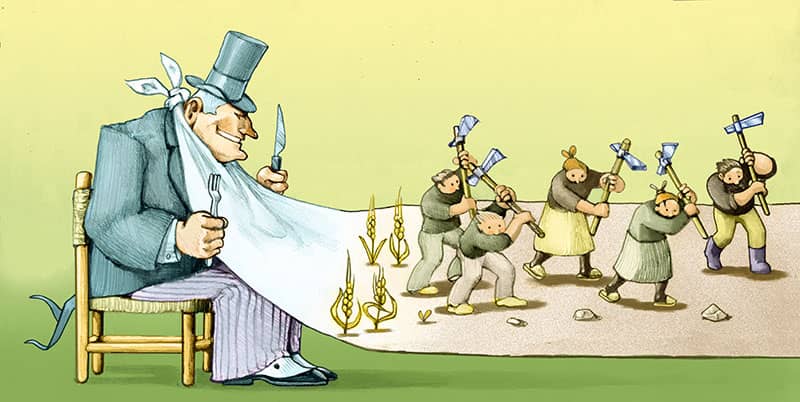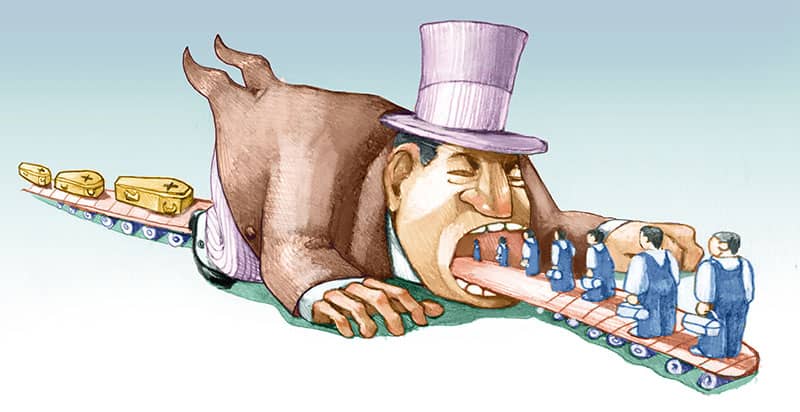In sociology, alienation is when humans feel disconnected or estranged from some part of their nature or from society. Individuals can be alienated from themselves and from others, often resulting in feeling powerless or without control over their own lives.
The term alienation was conceptualized by Karl Marx when he used alienation to describe the effects of capitalism on the working class. Before this, the meaning of alienation changed over the centuries.

In theology, alienation referred to the distance between humanity and God; in social contact theories, it meant the loss of an individual’s original freedom, whereas, in political economy, it referred to the transfer of property ownership (Musto, 2010).
In Marx”s Economic and Philosophical Manuscripts of 1844, he presented alienation as the phenomenon through which the labor product confronts labor ‘as something alien, as a power independent of the producer.’
According to Marx, the product of a worker’s labor under a capitalist system results in feeling alienated.
The production of labor is felt to belong to someone else and is simply a way for the worker to meet the needs of physical life – purely for wages. Thus, alienation can make an individual or society feel isolated, unworthy, and insignificant (Mukhopadhyay, 2020).
Marx widened the problem of alienation to the economic sphere of material production. Further, he proposed that the economic sphere was essential to understanding and overcoming alienation in other spheres (Musto, 2010).
What Causes Alienation?
According to Marx, workers’ labor was less alienating in past societies. He claimed this was because the workers had more control over their working conditions, the work was highly skilled, and they would make the whole product from start to finish.
This means that the work was more satisfying because the workers could see themselves in what they produced.
However, with the introduction of capitalism and industrial factories in the 19th century, this craftsmanship decreased. Workers had less control over their work, were often unskilled, and were often just part of a production line.
This, according to Marx, generates high levels of alienation, feelings of powerlessness, and not being in control.
According to Marx, the economic system itself is what causes alienation. The introduction of machines increases the division of labor within society; the worker’s task becomes less skilled, capital is accumulated, and thus workers become increasingly fragmented (Boudon & Bourricaud, 1989).
Other sociologists have developed concepts that were later associated with alienation. The economic instability and social upheaval that tends to go along with capitalism lead to what Émile Durkheim coined ‘anomie.’
Anomie is used to indicate a set of phenomena whereby the norms of social structures enter into crisis following an extension of the division of labor (Musto, 2010).
People who experience anomie are more likely to feel isolated from their society. This happens because they no longer see their personal values and norms reflected in the world around them.
Note that alienation and anomie are not the same thing. Alienation occurs when an individual feels disconnected from their work or surroundings. Anomie occurs when there is a lack of shared values and norms in society.
While this can lead to individuals feeling lost and alienated, alienation, in Marx’s sense, is caused by the overlying structure of capitalism, while anomie is a social fact pertaining to individuals.
Marx 4 Types of Alienation
Alienation means the lack of power, control and fulfillment experienced by workers in capitalist societies which the means of producing goods are privately owned and controlled.
According to Karl Marx in the Economic and Philosophical Manuscripts of 1844, the capitalist system leads to four distinct ways in which workers are alienated:

Alienation From the Product of Labor
Instead of the workers crafting products from the initial idea to completion, under capitalism, the product is entirely directed by someone else.
The product is highly specific in nature, is repetitive, and workers may only produce one aspect of a larger product on a production line.
Thus, the final product does not feel like the worker’s own and is creatively unrewarding. The product becomes an alien object, one that the worker produces only for the means of wages and survival.
Marx stated:
‘…the object which labor produces – labor’s product – confronts it (the worker) as something alien, as a power independent of the producer… Under these conditions, this realization of labor appears as loss of realization of the workers.’
Alienation From the Process of Labor
Instead of having the freedom to choose how and when they work, workers under a capitalist system must work as and when their employer requires.
They also must complete the tasks set by their employer, meaning that the process of labor is something external to the worker.
According to Marx, the process of labor:
‘does not belong to his intrinsic nature… in his work he does not affirm himself but denies himself… does not freely develop his physical and mental energy.’
Marx perceived the process of labor as directed against the worker as if it ‘does not belong to him.’ While the process of labor is not physically forced upon workers, it is forced in the sense that it becomes non-voluntary.
If the worker does not want to starve and must pay for their home, they feel forced to engage in the process of labor under capitalism.
Alienation From the Self
According to Marx, satisfying work is an essential part of being human. Since workers under capitalism feel alienated from the product and the process, it is not satisfying.
Karl Marx asserted that capitalism is a system that alienates the masses and that workers do not have control over the goods they produce for the market.
Marism is criticial of capitalism because that the people who are the laborers behind the goods and services lose their value over time. When once the workers would have crafted the whole product, they may now be reduced to producing one component on the production line.
Work under capitalism alienated individuals from themselves since work is no longer a joy, but simply a means to earn wages to survive.
Marx implied that the work:
‘…estranges from man… his human aspect.’
Workers become alienated from their true selves, desires, and the pursuit of happiness by the demands placed on them by capitalists.
They are essentially converted into objects by the production method, meaning they are viewed and treated not as humans but as replaceable elements of a system.
Alienation From Other Workers
Under capitalism, workers are encouraged to compete against each other for jobs, better products, and higher profits. This pits individuals against each other in a competition to sell their labor for the lowest possible value.
Instead of seeing and understanding their shared experiences and developing class consciousness, alienation prevents this and instead fosters false consciousnesses.
According to Marx, alienation:
‘(leads to)…the estrangement of man from man… Hence within the relationship of estranged labor each man views the other in accordance with the standard and the relationship in which he finds himself as a worker.’
Under capitalism, workers become profit-maximizing and self-interested individuals. Workers treat others as objects and as instruments to reach an end goal.
How to Overcome Alienation According to Marx
To overcome alienation, Marx suggested that changing perception is not enough. Rather, a reorganization of society is required. According to his historical materialist approach, this is the next step to liberate workers.
Marx predicted that there would be a proletariat revolution that would put an end to capitalism and bring about communism. The continued exploitation of the capitalists would cause the revolution.
A proletariat revolution is a social revolution in which working-class laborers attempt to overthrow the capitalist bourgeoisie. In the Communist Manifesto, written in 1848, Marx and Engels proposed that the proletariat revolution was inevitable and would be caused by the continued exploitation of the capitalists. The workers will eventually revolt due to increasingly worse working conditions and low wages.
In a communist society, there would be shared resources, wealth, and no social classes. The accumulated labor would widen and enrich the laborer’s existence rather than exploit it.
Since there would be no private property, it can be assumed that the workers would have control over their work, meaning that feelings of alienation would lessen.
Frequently Asked Questions
How Does Alienation Affect Workers’ Sense of Control?
Alienation can make workers feel powerless. Alienation in a capitalist society can make individuals believe that what happens in their lives is outside their control and that whatever they do does not matter.
If they feel controlled by the capitalists at work, this may extend into other areas of control in their lives.
Interacting with their boss may increase the lack of a sense of control. If the worker does not feel empowered enough to speak their opinions or give honest feedback, they are less inclined to do so. This can result in less control over their work and more power for the capitalists.
How Does Alienation Influence Job Satisfaction?
Alienation is believed to result in decreased job satisfaction. Specifically, alienation increases need deprivation, resulting in lower job involvement and ultimately decreased identification with their work organization (Efraty et al., 1991).
Other findings indicate that feeling powerless and meaningless in work (work alienation) influences organizational commitment and work effort. When workers feel that they have little to no influence in their labor and feel that their labor is not worthwhile, this can have adverse effects on these outcomes (Tummers & Den Dulk, 2013).
How is Alienation Relevant Today?
A Marxist theory of alienation can explain the paradox of social power and loneliness that is often seen in capitalist societies today (Øversveen, 2021).
There is a global rise in self-reported loneliness, isolation, and mental illness, which may result from cultural, technological, and environmental change, along with the rise of political movements that seek to capitalize on feelings of social frustration in societies (Berardi, 2017)
References
Berardi, F. (2017). Futurability: the age of impotence and the horizon of possibility. Verso Books.
Boudon, R., & Bourricaud, F. (1989). A critical dictionary of sociology. University of Chicago Press.
Efraty, D., Sirgy, M. J., & Claiborne, C. B. (1991). The effects of personal alienation on organizational identification: a quality-of-work-life model. Journal of Business and Psychology, 6 (1), 57-78.
G. Tummers, L., & Den Dulk, L. (2013). The effects of work alienation on organizational commitment, work effort and work‐to‐family enrichment. Journal of nursing management, 21 (6), 850-859.
Marx, K. (1992). Economic and philosophic manuscripts of 1844.
Mukhopadhyay, R. (2020). Karl Marx”s Theory of Alienation. Available at SSRN 3843057.
Musto, M. (2010). Revisiting Marx”s concept of alienation. Socialism and Democracy, 24 (3), 79-101.

